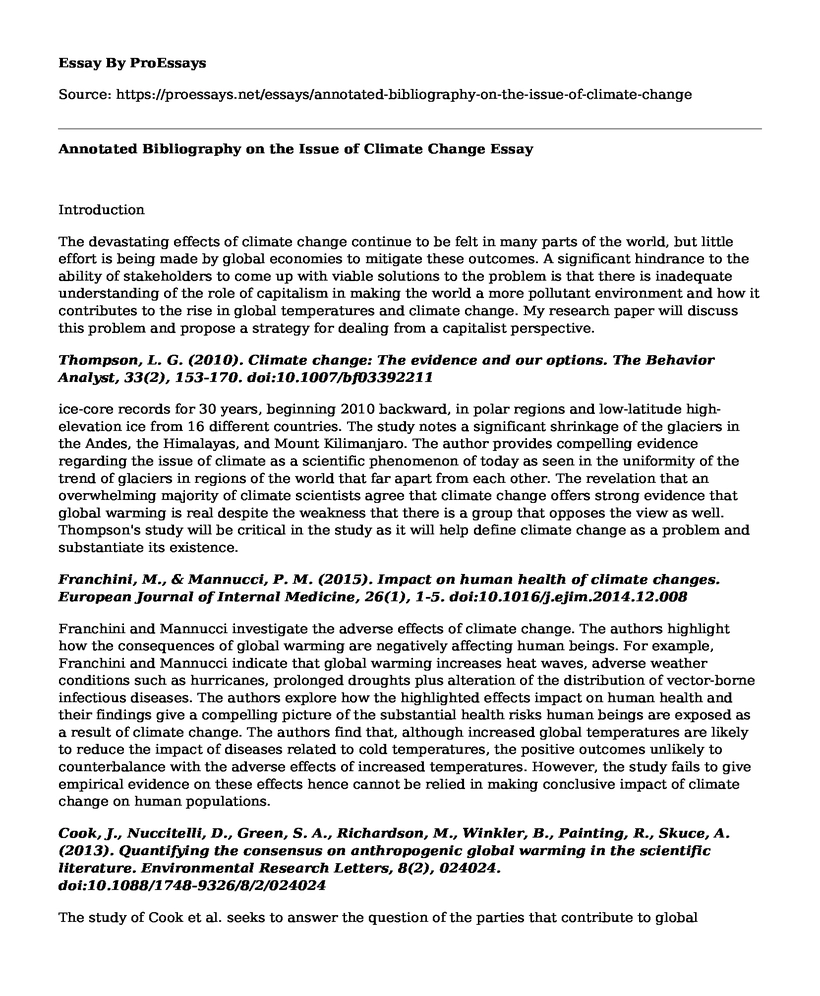Introduction
The devastating effects of climate change continue to be felt in many parts of the world, but little effort is being made by global economies to mitigate these outcomes. A significant hindrance to the ability of stakeholders to come up with viable solutions to the problem is that there is inadequate understanding of the role of capitalism in making the world a more pollutant environment and how it contributes to the rise in global temperatures and climate change. My research paper will discuss this problem and propose a strategy for dealing from a capitalist perspective.
Thompson, L. G. (2010). Climate change: The evidence and our options. The Behavior Analyst, 33(2), 153-170. doi:10.1007/bf03392211
ice-core records for 30 years, beginning 2010 backward, in polar regions and low-latitude high-elevation ice from 16 different countries. The study notes a significant shrinkage of the glaciers in the Andes, the Himalayas, and Mount Kilimanjaro. The author provides compelling evidence regarding the issue of climate as a scientific phenomenon of today as seen in the uniformity of the trend of glaciers in regions of the world that far apart from each other. The revelation that an overwhelming majority of climate scientists agree that climate change offers strong evidence that global warming is real despite the weakness that there is a group that opposes the view as well. Thompson's study will be critical in the study as it will help define climate change as a problem and substantiate its existence.
Franchini, M., & Mannucci, P. M. (2015). Impact on human health of climate changes. European Journal of Internal Medicine, 26(1), 1-5. doi:10.1016/j.ejim.2014.12.008
Franchini and Mannucci investigate the adverse effects of climate change. The authors highlight how the consequences of global warming are negatively affecting human beings. For example, Franchini and Mannucci indicate that global warming increases heat waves, adverse weather conditions such as hurricanes, prolonged droughts plus alteration of the distribution of vector-borne infectious diseases. The authors explore how the highlighted effects impact on human health and their findings give a compelling picture of the substantial health risks human beings are exposed as a result of climate change. The authors find that, although increased global temperatures are likely to reduce the impact of diseases related to cold temperatures, the positive outcomes unlikely to counterbalance with the adverse effects of increased temperatures. However, the study fails to give empirical evidence on these effects hence cannot be relied in making conclusive impact of climate change on human populations.
Cook, J., Nuccitelli, D., Green, S. A., Richardson, M., Winkler, B., Painting, R., Skuce, A. (2013). Quantifying the consensus on anthropogenic global warming in the scientific literature. Environmental Research Letters, 8(2), 024024. doi:10.1088/1748-9326/8/2/024024
The study of Cook et al. seeks to answer the question of the parties that contribute to global warming. Building studies done previously, the researchers conducted a landmark study that evaluated 11944 abstracts of papers on climate change, global warming from 1991 to 2011. The study finds that 66.4% of abstracts no position on global warming, 32.6% endorsed climate change and 0.7% rejected the idea of climate change. The compelling aspect of the findings is that 97 percent of the climate scientists who showed consensus agreed that climate change is a real phenomenon and is primarily caused by human activity. Giving this verdict, however, the scientists recognized that the number of who expressed no position of the reviewed articles outweigh those that agreed that climate change is real and is caused by humans. This is the weakest aspect of the study.
Klein, N. (2015). This changes everything: Capitalism vs climate. Energy Law Journal, 36(147), 147-155. Retrieved from https://www.eba-net.org/assets/1/6/21-147-Blakeway-Final-4.27.pdf
Naomi Klein confronts the question of the hindrances to the efforts of reducing the global rise in temperature. At the core of this study is the role of capitalism in climate change efforts. Klein argues that technological solutions to the problem of climate change are currently available. The major hindrance is politics related to capitalism as the model for major economic systems in the world. In the argument, Klein provides a convincing connection between human beings and climate change by proving that capitalism is the link between people and global warming. Her discussion will be valuable in the study because it portrays capitalism as an avenue through which global governments will secure a better future world as opposed to depicting the model as the problem to climate change. This is important in coming up with resolutions to the question of global warming.
References
Cook, J., Nuccitelli, D., Green, S. A., Richardson, M., Winkler, B., Painting, R., ... Skuce, A. (2013). Quantifying the consensus on anthropogenic global warming in the scientific literature. Environmental Research Letters, 8(2), 024024. doi:10.1088/1748-9326/8/2/024024
Franchini, M., & Mannucci, P. M. (2015). Impact on human health of climate changes. European Journal of Internal Medicine, 26(1), 1-5. doi:10.1016/j.ejim.2014.12.008
Klein, N. (2015). This changes everything: Capitalism vs climate. Energy Law Journal, 36(147), 147-155. Retrieved from https://www.eba-net.org/assets/1/6/21-147-Blakeway-Final-4.27.pdf
Thompson, L. G. (2010). Climate change: The evidence and our options. The Behavior Analyst, 33(2), 153-170. doi:10.1007/bf03392211
Cite this page
Annotated Bibliography on the Issue of Climate Change. (2022, Nov 29). Retrieved from https://proessays.net/essays/annotated-bibliography-on-the-issue-of-climate-change
If you are the original author of this essay and no longer wish to have it published on the ProEssays website, please click below to request its removal:
- The Japanese Earthquakes and Tsunami - Paper Example
- The Relationship Between Weathering, Erosion and Transportation - Research Paper
- Solution to Deforestation Essay
- Sip on Soda: Enjoy the Refreshment of Aluminum Cans!
- Essay Example on the Climatic Change in Canada
- Essay Example on Green Theory: A Framework for International Cooperation on Environmental Issues
- Climate Crisis: Human Activities Threatening Global Environment & Health - Paper Sample







